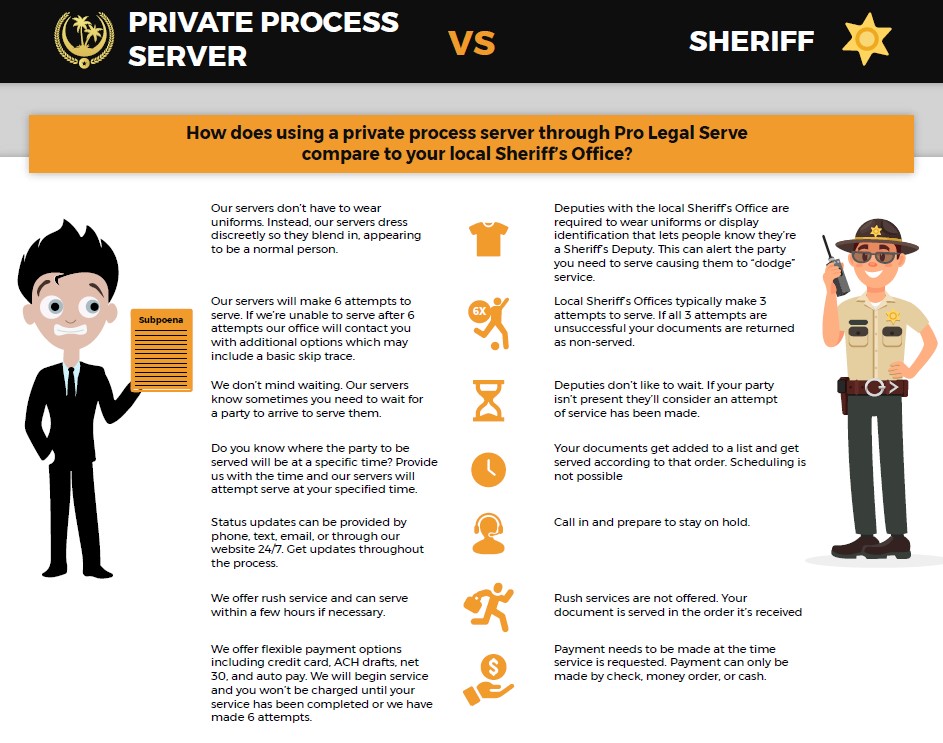The Crucial Role of Process Serving in Court and Legal Procedures
The Crucial Role of Process Serving in Court and Legal Procedures
Blog Article
The Function of Process Offering in Ensuring Legal Conformity
Refine offering is a vital element of the lawful framework that makes sure all parties get timely and ideal notification of legal activities. By recognizing the complexities of procedure serving, including its methods and legal requirements, stakeholders can value exactly how it fortifies the judicial system.
Value of Legal Alert
Lawful notice offers as a fundamental pillar in the judicial procedure, guaranteeing that all events involved are paid for the possibility to react and defend their passions. This concept is important to keeping the stability of legal proceedings, as it supports the right to due process, a foundation of democratic lawful systems. When entities or individuals are correctly alerted of lawsuits versus them, they can adequately prepare their defense, thereby advertising justness and openness in the judicial arena.
In addition, legal notification facilitates informed decision-making amongst parties, allowing them to analyze their options and possible outcomes. Without correct alert, plaintiffs may be robbed of their legal rights, resulting in unjust judgments or default judgments. This can ultimately weaken public confidence in the lawful system and its capacity to supply fair resolutions.
Additionally, the timely and exact shipment of lawful notifications is essential for the effective functioning of the courts. It reduces delays and ensures that cases progress with the judicial system without unnecessary barriers. Consequently, sticking to the procedures surrounding lawful alert is not only a lawful obligation but likewise a crucial component in promoting a effective and reasonable lawful procedure.
Process Serving Techniques
Refine offering incorporates numerous techniques developed to ensure that lawful papers are provided to the suitable events in a prompt and effective way. The most traditional technique is individual service, where a procedure web server literally hands the documents to the individual called in the lawsuit. This method is usually favored because of its integrity, as it ensures that the recipient is directly educated.
An additional common technique is substituted service, which allows files to be left with a person of ideal age or discretion at the recipient's house or workplace. This approach is utilized when personal service is not practical, making certain that the person still gets notification.
Furthermore, solution by mail is allowable in certain territories, where papers are sent out via registered or accredited mail, frequently calling for a signed receipt to confirm distribution. Some territories additionally allow solution via electronic methods, such as e-mail or fax, especially in circumstances entailing service entities.

Lawful Needs and Conformity

Trick lawful demands often include the requirement of offering files in a timely way, making use of licensed individuals, and supplying appropriate notice to the party being offered. For example, several jurisdictions need that process servers be accredited or registered, ensuring they are educated regarding local laws and procedures. Certain files may call for extra procedures, such as registration or a specific approach of shipment, to be taken into consideration valid - Process Serving.
In addition, the method of service may vary relying on the nature of the instance and the area of the defendant. Understanding these subtleties is vital for use this link legal specialists and process web servers alike. Failing to follow these lawful needs can bring about challenges in court, possibly dismissing the situation or postponing proceedings. Careful interest to conformity is vital in the procedure serving landscape.
Repercussions of Improper Service
Inappropriate solution of legal files can have considerable effects that prolong beyond simple procedural missteps. When legal papers are not served correctly, it can result in hold-ups in legal proceedings, potentially impeding a celebration's ability to successfully respond or safeguard their case. This can cause undesirable judgments or dismissals, inevitably impacting the end result of the lawful matter.
Furthermore, incorrect service may result in raised legal costs, as events might need to launch additional procedures to remedy the service issue. Courts typically need strict adherence to service methods, and failure to abide can undermine the integrity of the judicial process. In some instances, a celebration might shed the right to seek their insurance claims or defenses due to disobedience with service demands.
Furthermore, incorrect service can create complication this article relating to timelines and commitments, triggering more issues in case. It may also prompt motions or allures to reconsider, prolonging the resolution of disputes. In summary, the repercussions of improper service are far-ranging and can significantly interfere with lawful proceedings, highlighting the need for thorough compliance with well-known service procedures.
Advantages of Specialist Process Servers
Engaging expert process servers offers numerous benefits that can enhance the efficiency and efficiency of legal proceedings. Firstly, these professionals possess specialized training and expertise in the subtleties of lawful records and solution legislations, guaranteeing conformity with administrative requirements. This knowledge reduces the danger of inappropriate solution, which can lead to expensive delays or perhaps situation dismissal.
Secondly, specialist process-server often have actually developed procedures and systems to track and record service attempts, offering customers with prompt updates and comprehensive reports. This openness promotes trust fund and enables lawful teams to plan successfully.
In addition, hiring a professional process-server can save beneficial time for attorneys and their staff (Process Serving). By outsourcing this essential task, lawful professionals can concentrate on case preparation and client representation, eventually boosting their overall productivity
Furthermore, expert process-server are skilled at taking care of tough circumstances, including evasive accuseds, this article which might need determination and tact. Their experience in handling such challenges boosts the probability of successful service.
Final Thought
In verdict, process offering is necessary for keeping legal conformity and upholding the concepts of due procedure. Ultimately, the role of specialist process servers is essential in enhancing public confidence in the integrity and performance of legal proceedings.
Process serving is an essential component of the lawful structure that guarantees all celebrations obtain timely and appropriate notice of lawful activities. Sticking to the procedures bordering lawful notice is not just a legal commitment yet also a vital part in cultivating a reliable and reasonable lawful process.
The most conventional method is individual solution, where a procedure web server literally hands the papers to the specific named in the lawful action. When legal documents are not served properly, it can result in delays in lawful process, potentially impeding a party's capability to effectively react or safeguard their situation.In verdict, process serving is necessary for maintaining lawful conformity and promoting the principles of due procedure.
Report this page